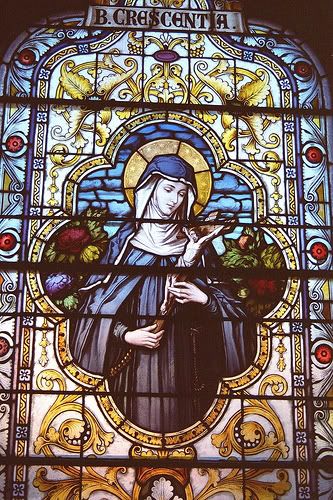Born in a small town near Augsburg, Bavaria, Crescentia survived a poor childhood with grace and joy. Her father, a weaver, had little money to support the family, and yet Crescentia was renowned in the area for her cheerful disposition, and her willingness to give the little she had to those who needed it more. She spent her days at the local church praying, and received her first Holy Eucharist at the unusually young age of seven due to her knowledge of the catechism and her demonstrated love for the Lord. Residents of the town, Catholic and non-Catholic alike, referred to her as “the little angel.” At this time, around age seven, while praying in the chapel of the Franciscan convent, she heard a voice which said, “this shall be your dwelling place.”
When Crescentia reached 18, she professed her desire to join the Third Order of Saint Francis, which her father approved of. He approached the convent, but her admission was refused as she didn’t have a sufficient dowry to accompany her. Crescentia bore this rejection with grace and humility, as she bore all other difficulties. It wasn’t until the Protestant mayor of the town, who shared the same affection for Crescentia as all the town’s residents, intervened that she was accepted into the Order.
However, life was not easy for Crescentia once she took the veil. Rather, her sisters, under the direction of the Superior, treated her poorly, referring to her as “beggar,” and expecting her to perform the most menial tasks. She was not provided with her own cell, forced to beg her sisters to sleep in a corner each night. All of these things, as prior to her monastic life, she suffered with piety and grace—so much so, that her sisters would accuse her of hypocrisy. But Crescentia’s faith would not be dampened, nor would her sprits. She performed the menial tasks given to her better than anyone else could have, praying constantly while she did, and thanking the Lord for the opportunity. Following reception of the Holy Eucharist, she began experiencing visions of the Lord, which at first concerned her, and later brought her comfort.
After some years, a new Superior was appointed to direct the convent, and with her, change came upon the place. The new Superior recognized the piety and obedience of Sister Crescentia, and through her leadership, so did the community. She was appointed Mistress of Novices, and then years later, Superior of the convent. Both positions she reluctantly accepted with humility and grace. Under her direction, the rules were strictly enforced, but with compassion and joy. Warmth and humor guided her daily interactions with her sisters.
Word of Crescentia’s piety and grace spread, as did her humility. Local nobles, heads of state, and learned scholars consulted with Crescentia for spiritual direction. She became known for practical solutions to problems and a common-sense approach. Her advice to her visitors always stressed the need for prayer but also encouraged the petitioner to do everything possible to resolve the issue.
Crescentia and her community demonstrated great kindness to the poor and those in need. She welcomed all as brothers and sisters of Christ, and treated them with respect, dignity, and charity. To her sisters she recommended observing silence, recollection, and spiritual reading, especially the Gospels. The teacher of their religious life had to be Jesus on the Cross.
 In her years as superior of the community, the convent underwent a renewal. No one with a heart for the Lord was turned away, regardless of the size of their dowry. Crescentia justified her selectivity regarding vocations saying, "God wants the convent rich in virtue, not in temporal goods.” She emphasized to her sisters unlimited trust in divine providence, readiness in the acts of the common life, love of silence, devotion to Jesus crucified, and devotion to the Eucharist and the Blessed Mother.
In her years as superior of the community, the convent underwent a renewal. No one with a heart for the Lord was turned away, regardless of the size of their dowry. Crescentia justified her selectivity regarding vocations saying, "God wants the convent rich in virtue, not in temporal goods.” She emphasized to her sisters unlimited trust in divine providence, readiness in the acts of the common life, love of silence, devotion to Jesus crucified, and devotion to the Eucharist and the Blessed Mother. As she aged, Crescentia was beset with many physical ailments, which she endured with patient and joyful suffering. Eventually, her hands and feet became so crippled, she was unable to straighten her body and was confined to her bed, in the fetal position. Like Saint Francis, she cried out to the Lord, grateful for the gift of her limbs so that she might suffer. She died at peace on Easter Sunday, surrounded by her sisters.
 Saint Crescentia had many reasons and opportunities to turn from the Lord, based upon the way others treated her. And yet, throughout her trials, humiliation, and suffering, her faith in God only deepened and grew. It was this faith that led her to transform her community, re-centering her sisters in the love of Christ, and the acceptance of all. She taught her charges, and in doing so teaches us, to never criticize others unkindly. Moreover, through her life, she reminds us that God is pleased by our gracious suffering, enduring all with patience and hope.
Saint Crescentia had many reasons and opportunities to turn from the Lord, based upon the way others treated her. And yet, throughout her trials, humiliation, and suffering, her faith in God only deepened and grew. It was this faith that led her to transform her community, re-centering her sisters in the love of Christ, and the acceptance of all. She taught her charges, and in doing so teaches us, to never criticize others unkindly. Moreover, through her life, she reminds us that God is pleased by our gracious suffering, enduring all with patience and hope.Prayer of Love to God (written by Saint Crescentia Hoess)
Grant, O God, that love and suffering may grow hand in hand in me, so that I may love you more and more with the cheerful disposition which is the fruit of love. O Lord, only grant me love for you, and I shall be rich enough. I desire only that you leave me to my nothingness and that you alone, if I may say so, be all in all and loved and honored by everybody. I wish to take pleasure in nothing but only in you and your love.
Day 96 of 365
Prayer Intentions: Acceptance and love for all; Patient suffering.
Requested Intentions: For Healing (A); The blessing of children (S); Safety of travelers (J); Improved family relationship with the Lord, using gifts for His glory (L); For a restorative, faith-deepening Lent for all those who are struggling (L).










0 comments:
Post a Comment
Thanks for leaving a comment. If you wish to submit a prayer request, however, please do so above, using the "Contact" tab.